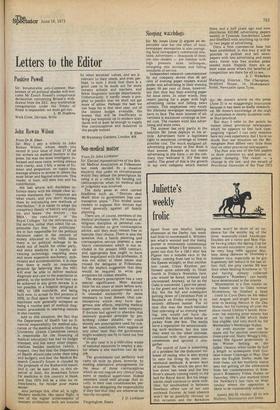Non-medical matter
From Dr John Linklater Sir: Elected representatives of the British Medical Association at Folkestone last week decided by a massive majority that under no circumstances would they debase the prescription by using it as a vehicle for handing out contraceptives when no medical skill or judgment was involved.
The daily press at once carried headlines such as, " Doctors deal death blow to government free contraception plans." This misled some readers to suppose that doctors had voted generally against all family planning.
There are, of course, members of the medical profession who, for reasons of religious discipline or personal conviction decline to give contraceptive advice, and they must remain free to exercise their choice. There is also the question that a family planning and contraceptive service imposes a new heavy commitment which is not included in the present NHS contract, and appropriate fees ought to have been negotiated with the profession. It was not either ot these issues that roused the delegates at Folkestone, but the implicit suggestion that they would be required to write prescriptions for rubber sheaths.
The doctor's prescription has a very special significance. Most doctors train for six years or more before writing a prescription unsupervised, and it is intended exclusively for items necessary to treat disease. Oral contraceptives which may have dangerous side effects, requiring medical supervision, enter the same category. If doctors had agreed to abandon that jealously guarded principle by prescribing rubber sheaths, we could shortly see prescriptions used for rubber teats, comforters, even nappies or any other item that the government might suddenly see fit to hand out free of charge.
In any case it is a ridiculous waste of national resources to employ a doctor where a slot machine can do the job.
The government can perfectly well carry on with its plans. however, by making alternative arrangements for the issue of those contraceptives which do not require any clinical judgment or medical supervision. Indeed members could well arrange that locally, in their own constituencies, perhaps even delegating the responsibility if they feel that they are otherwise too heavily occupied.
J. D. Linklater Fingringhoe, Essex,


































 Previous page
Previous page